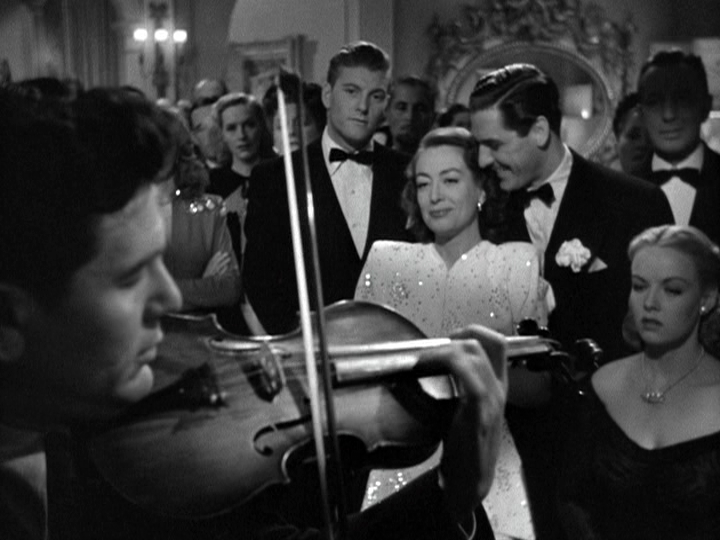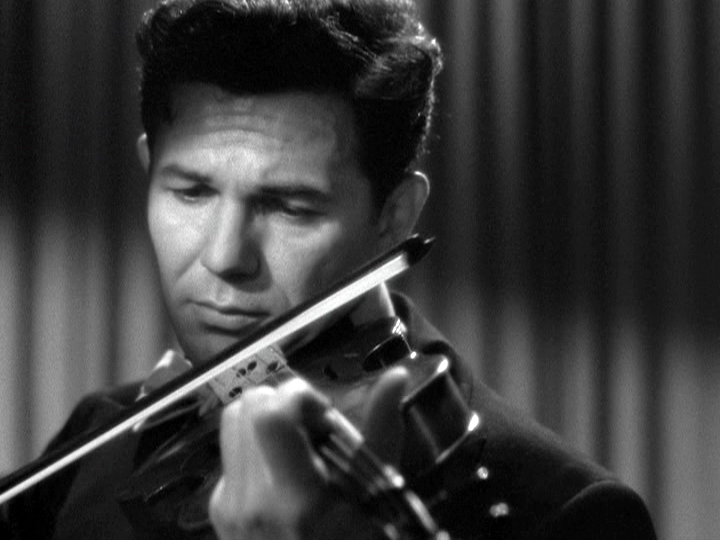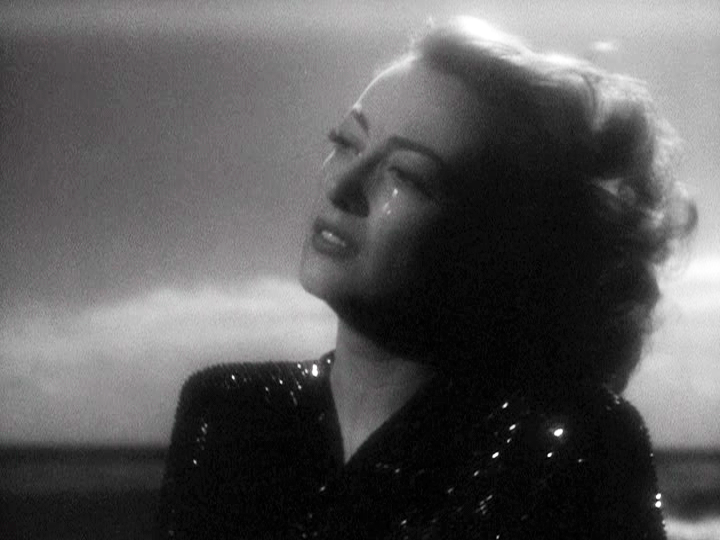Humoresque, 1946, Warner Bros. Starring Joan Crawford, John Garfield. Directed by Jean Negulesco. B&W, 124 minutes.
Violinist Paul Boray (John Garfield) has overcome family objections and the constraints of the Great Depression to achieve modest success as a musician. That’s not enough for him, however. To help his search for greater fame, his closest friend, wise-cracking Sid Jeffers (Oscar Levant), introduces him to socialite and patron of the arts, Helen Wright (Joan Crawford).
The two begin a tug-of-war toying of the emotions, with Paul mindful of her married status and she, not used to being rebuffed by men, alternately playing it coy, then cool. Paul has a childhood sweetheart who is clearly better for him then the tempestuous Helen, but he is being pulled into her affections.
It is a dangerous situation, and both are aware of the potential destruction to their lives. Still, as happens so often, passion draws them into a deeper and wider stronghold against their better judgment. At the same time, Paul is torn by his mother’s insight into his career and tortured relationships.

John Garfield, Joan Crawford
The relationship between patron and musician is complex, and performances by both Garfield and Crawford are up to the task of portraying the intricacies of the dynamics between the two. This is often noted as one of Crawford’s finest roles, coming on the heels of her Academy-Award winning portrayal of Mildred Pierce.
Close-ups of Garfield playing the violin are actually the hands of famed violinist Isaac Stern, who also served as musical adviser for the film and was the solo violinist on the film’s soundtrack. Stern was only 25 at the time, and this was a huge boost to his career.

John Garfield
Crawford later recalled one scene, in which she performs her own stunt by falling off a horse going at full gallop, in an interview with a biographer. “I must have been crazy because I said I wanted to do my own stunt. They must have been crazier, because they let me do it.
“The powers-that-be had decided it was too racy to have Johnny Garfield lay on top of me. We had to re-shoot the scene so I ended up on top of him. That passed. I couldn’t really understand what was the difference, him on top of me or me on top of him.
“Well, the difference was I had to fall off the horse again. I did, and I lived to tell the tale.”

Joan Crawford
The film was nominated for one Academy Award for Best Music, Scoring (Franz Waxman).
A musical term, “humoresque” means “a short, lively piece of music,” and while that is heard throughout the film, it is perhaps not the strongest title for the film, nor does it give much of an indication of its plot or tone.
One of the few movies ever made that features classical music in a key role, Humoresque is a compelling tale of a complicated relationship with flawed characters and an uneven path to romance, a path that ultimately leads to tragedy born of emotional, and likely distorted, decisions.

Wonderful actors, yet I have never heard of this movie.
LikeLiked by 1 person
I don’t think it’s gotten a lot of attention in the past 20 years. It is very well-acted, maybe a teeny bit more dated than some of their other films.
LikeLike
Spot on, Belinda. I somewhat get the movie title but as you perfectly put it…not the strongest title for the movie.
LikeLiked by 1 person
Yeah, it was an unfortunate choice, I think. Thank you for your loyalty to this blog!
LikeLiked by 1 person
You’re welcome. Look forward to each and every one of your articles. Each one is wonderful and with each one I learn something I didn’t know before…so, I thank you!
LikeLiked by 2 people
One of Crawford’s very best roles. She’s almost playing a supporting character, but she dominates the entire film!
LikeLiked by 1 person
Agreed. She really was a remarkable actress, right from the beginning. I just saw her again in “Grand Hotel” and she rose to the level of the highly talented actors and actresses she was working with, something you don’t always see happen.
LikeLiked by 1 person
Crawford is very underrated! She’s indeed great in “Grand Hotel”, considering the strong competition, not an easy task! She nearly stole “The Women” too!
LikeLiked by 1 person
If you freeze-frame the fall-from-the-horse sequence, it’s not Crawford doing it but a stand-in: Crawford was too valuable to be galloping around and the same went for Garfield, who was riding no more than a plank.
LikeLiked by 1 person